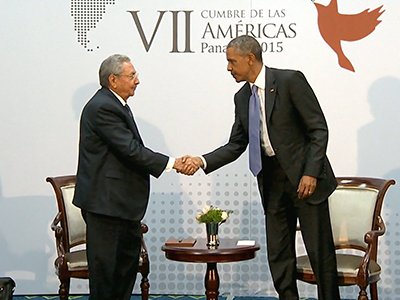Luke Skywalker
Super Moderator
{vb:raw ozzmodz_postquote}:
Get the news
Log In or Subscribe to skip
220 6 [h=6]Share This Story![/h]Let friends in your social network know what you are reading about
[h=4]Obama, Castro hold first talk between nations in 50 years[/h]Sitting just a few feet from one another, President Obama and Cuban President Raúl Castro gave heartfelt, starkly different speeches Saturday at the Summit of the Americas.
{# #}
[h=4]Sent![/h]A link has been sent to your friend's email address.
[h=4]Posted![/h]A link has been posted to your Facebook feed.
[h=6]Join the Nation's Conversation[/h]To find out more about Facebook commenting please read the Conversation Guidelines and FAQs
[h=2]UP NEXT[/h][h=2]03[/h]
The leaders of the United States and Cuba held their first formal meeting in more than half a century on Saturday, clearing the way for a normalization of relations that had seemed unthinkable to both Cubans and Americans for generations. (April 11) AP
Cuban President Raul Castro and U.S. President Obama shake hands.(Photo: AFP/Getty Images)
PANAMA CITY — President Obama and Cuban President Raúl Castro met in the first sit-down talks between the top leaders of U.S. and Cuba in more than a half-century Saturday afternoon.
Obama said the U.S. is ready to "turn the page" with Cuba but significant differences remain. "This is obviously an historic meeting," he said. After 50 years of policy that had not worked, "it was time for us to try something new."
The discussion is the most meaningful face-to-face encounter between U.S. and Cuban presidents since Dwight Eisenhower and Fugencio Batista met in 1956 — incidentally, at another summit like this one organized by the Organization of American States in Panama.
Castro said the two nations can have differences but respect each other's ideas. "We are willing to discuss everything, but we need to be patient, very patient," the Cuban leader said. "We might disagree on something today on which we could agree tomorrow."
Earlier Saturday, Obama and Castro gave starkly different speeches at the Summit of the Americas. The speeches were the first official order of the summit's second and final day. "The United States will not be imprisoned by the past," Obama said during his address Saturday afternoon before the two leaders met. "We're looking to the future."
Castro began his 46-minute speech by saying he had asked for more time than the allotted eight minutes for his discourse, because he'd been banned from the previous six summits, drawing laughs from the room. In an impassioned speech, Castro at times pounded the table as he recounted previous perceived hostility from the United States stretching back to U.S. intervention during the Cuban War of Independence in 1898, the Platt Amendment, the failed Bay of Pigs invasion and the ongoing economic embargo.
"None of this is the responsibility of President Obama," Castro said, repeatedly praising the American president. He added: "President Obama is an honest man."
The speeches come on the heels of a historic handshake by the two leaders at the summit late Friday, seen as another step toward defrosting five decades of icy relations between the countries. The White House said the interaction was informal and the leaders didn't engage in substantive conversation then. The pair spoke by phone Wednesday to pave the way for more meaningful discourse here.
Also Saturday, Venezuelan President Nicolás Maduro gave an expected fiery speech accusing the United States of intervening in its affairs. Last month, the White House announced sanctions against seven high-ranking Venezuelan officials accused of human rights violations and jailing opposition leaders.
Maduro accused the U.S. of plotting an assassination attempt against him but also said he was not "anti-United States" just "anti-imperialism." He cited his admiration of Jimi Hendrix and Eric Clapton.
"I respect you but I don't have confidence in you, President Obama," Maduro said. Later in his speech, he outstretched his hand and offered to meet with the U.S. president to discuss their differences.
The main topic Saturday remained U.S.-Cuba relations. A few hours after the opening speeches, Obama and Castro met in a small room in the convention center for about an hour, discussing such issues as reopening embassies in each country and increasing business activity between the two nations. With Castro sitting at his side, Obama told reporters that the two countries will continue to have differences and that he would still speak out for democracy and human rights. But they would move forward, he said, respectful of their differences.
"Over time, it is possible for us to turn the page and develop a new relationship between our two countries," Obama said.
The two leaders then stood and shook hands.
The meeting is the latest in a series of rapidly-escalating steps to normalize relationships between the two countries. The White House said last week that Obama would soon decide whether to remove Cuba as a state sponsor of terrorism, possibly even at the summit. The president said the State Department has completed its review on the issue but he has yet to review the recommendation.
Removal from the list after 33 years would allow American banks and businesses to operate in Cuba, and clear an impediment to full diplomatic relations with the United States. If talks at the summit go well, other announcements could include the reopening of embassies and other steps to normalized ties.
The United States and Cuba have been working to restore diplomatic ties since December, when Obama held the first conversation between U.S. and Cuban leaders in more than a half-century as part of the first steps toward normalizing ties.
0) { %> 0) { %>
0) { %>
Powered By WizardRSS.com | Full Text RSS Feed
